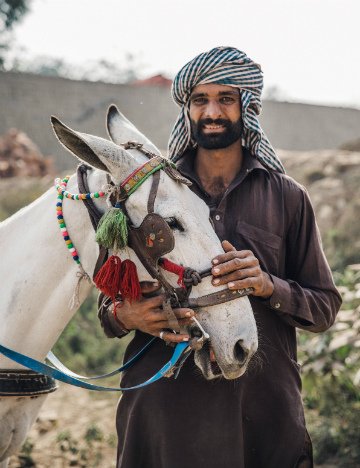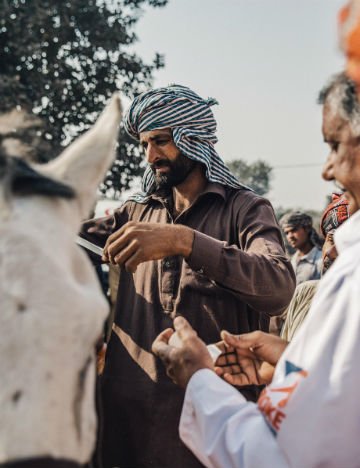Muhammad Arshad and his mule Moti
Muhammad is 35 and earns 500 – 700 rupees (£4 - £5) a day transporting bricks by cart at Hamza brick kiln, on the outskirts of Lahore, Pakistan. He owns Moti, a 15-year-old mule, who he uses to transport the bricks.
Moti has a good body condition score, had no wounds and was happy for a human to approach him, suggesting he has a good relationship with Arshad.

Arshad is a Brooke Community Change agent, meaning the Brooke team identified him as being particularly passionate about animal welfare and have trained him up to spread Brooke’s message to other owners in the brick kiln. He also leads community engagement sessions and is often the first point of contact if another owner has a question or problem.
Before Arshad attended Brooke’s meetings, he believed in traditional myths and practices, much like many of the other owners in the brick kiln. For example, when treating wounds, Arshad would rub salt and break oil into them, if a horse showed signs of colic, he would feed it tobacco and molasses, and if a horse was lame he would fire the joint.
Arshad and his fellow owners now have the knowledge to correctly manage these symptoms.
I now think my mule’s life is just as important as mine. Brooke taught me that there is so much I can do with my own hands to make a positive change to Moti’s life, such as grooming, feeding and foot cleaning. I want to spread that message as far as I can.
One of Brooke’s lessons that has resonated particularly deeply with Arshad is that of grooming; “Just like me and my wife need clean, ironed clothes, so does Moti need grooming. Grooming brings us closer together and our love increases, we feel like he is a family member.”
Not long ago, Arshad noticed that the nails from Moti’s shoes were sticking out, causing bleeding as they brushed against the opposite leg. As the farrier was not based at Hamza brick kiln, it was expensive and inconvenient to keep returning to the farrier to have him rasp the nails down. Arshad thought that he would be able to manage this himself if he had the right tools: “I was worried and thinking what can I do?”
Arshad went to the market and found a rasp used in construction and adapted it by adding a wooden handle.

The homemade rasp allows Arshad to file down the nails himself to prevent injury to his horse.
It has been so successful that he has made two more rasps for fellow owners. Furthermore, he is on hand to show other owners how to file down a nail if he spots a horse with brushing wounds.
Brooke’s community engagement work has empowered owners like Arshad in the Hamza brick kiln. For Arshad, the most significant change has been the knowledge and ability to prevent common injuries and ailments; “Prevention is better than cure and it is our responsibility.”
